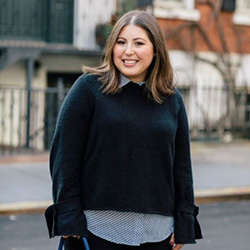Fashion marketing degree: A comprehensive overview
Fashion marketing, at its core, refers to the strategies and positioning created with the goal of selling clothes, shoes and accessories.

Why should you consider earning a fashion marketing degree? To sell a product or service, a solid marketing strategy is essential. Fashion marketing, at its core, refers to the strategies and positioning created with the goal of selling clothes, shoes and accessories.
In today's world, a strong marketing strategy is the key to a fashion brand gaining both cultural and economic significance. A sweater being worn by a prominent celebrity or going viral on TikTok can be a recipe for overnight success for a clothing brand—and many brands want in on this kind of success.
If you're looking to break into fashion marketing, there are so many exciting ways to do so. The fashion marketing industry is vast and full of opportunities, and an amazing way to use your creativity to make a lasting impact on trends and culture.
Fashion marketing origins

Prior to the 19th century, Fashion items were primarily marketed via print materials, like journals, illustrations and magazines. The rise of department stores in the mid 19th century gave way to other forms of advertising, like catalogs, billboards and posters.
The 21st century led to the decline of print mediums and the rise of digital. With channels like social media, email and search ads, fashion brands can now reach customers more quickly and pointedly than ever before.
One of the biggest pioneers in fashion marketing was 19th century designer Charles Frederick Worth. He is credited with starting the first ever haute couture fashion house (think Prada, Gucci, Versace, etc.) as we know them today, and he is also credited as being the first designer to sew brand labels into his clothing.
The 20th century saw the rise of the power of fashion public relations thanks to figures like Lady Duff-Gordon, who dressed the hottest celebrities at the time, and Eleanor Lambert, who created the Council of Fashion Designers of America. Vogue Magazine democratized fashion by making it accessible to anyone who could get their hands on a copy—and fashion advertising was forever changed by photographers like Irving Penn, Helmut Newton and Richard Avedon.
Types of fashion marketing degrees
You don't need a specific level of degree to get your start in fashion marketing, but higher-level or research-based roles may call for advanced degrees. Here are the types of degrees you can earn in fashion marketing:
Associate Degree
Duration: 2 years
Curriculum: Fashion history, fashion marketing, visual communication and merchandising, trend analysis, entrepreneurship
Career prospects: Fashion merchandising, visual merchandising, digital marketing, fashion buying
Bachelor's Degree
Duration: 4 years
Curriculum: Fashion branding, marketing analytics, consumer behavior, business management
Career prospects and benefits: Similar to an associate degree, but you have the potential to earn a higher salary upon graduating
Master's Degree
Duration: 1-2 years, depending on the program
Curriculum: Advanced subjects and specializations, like omnichannel retailing, supply chain management and social media marketing
Career prospects: Higher-level positions, like Chief Brand Officer and research-oriented positions
Doctorate/PhD
Duration: 3-5 years
Curriculum: Research-based focused studies on advanced topics like consumer behavior, fashion trends and sustainability
Benefits: Original contribution to the field of fashion marketing
Key courses covered in a fashion marketing major
When studying for your fashion marketing degree, you'll learn about multiple facets of the industry. Your education, ideally, should give you a well-rounded look at the fashion world so you can decide which area(s) you'd like to focus on for your career.
You'll learn about:
- The fashion industry: The current landscape of the fashion industry, globally and how it relates to greater cultural and economic trends.
- Consumer behavior in fashion: Why customers behave and buy the way that they do.
- Fashion marketing strategy and communications: How the most successful brands market themselves and how emerging technologies can be used to grow a brand.
- Merchandising and visual communication: How to use visual displays to convey a brand's story and entice shoppers to come in and buy.
The importance of internships and practical experience
Fashion marketing is very competitive. To stand out amongst other job applicants, it's important to get as much experience as you can while you're a student.
This can look like:
Gaining hands-on experience: Working at a retail store or interning at a brand's corporate office are both excellent examples of experiences you can gain while still studying for your degree.
Networking with brands: Networking is an important part of getting your foot in the door in the fashion industry. Try connecting with fashion marketing professionals on sites like LinkedIn to start building your network as soon as possible.
Building a portfolio: Even if you haven't been formally employed, you can still build a portfolio. Pick a few brands you admire and create case studies or mock examples of the kinds of campaigns you would create if you were hired. Showing what you can do is a valid alternative to showing what you've done if you don't have any professional experience.
The best way to get experience while you're still in school, according to Hailey Susser, Senior Manager of Integrated Marketing, is to, "take in as much as you can from the opportunities around you. Whether it is an internship or a position in a student magazine, there are plenty of ways to get involved. And if you can't find any, make your own! Social media is huge right now so look into creating content and learning on that end."
Career opportunities with a degree in fashion marketing
A degree in fashion marketing opens many doors. Fashion has so many avenues you can pursue—both physically and digitally. With your degree, you can choose to become a:
- Fashion brand manager: Overseeing a fashion company's branding and ensuring that branding-related decisions translate to more sales.
- Retail store manager: Managing the day-to-day operations of a retail store, including its employees, budget, in-store displays and event calendar.
- Fashion public relations specialist: Getting the brand press in digital and print publications that align with its target audience.
- Merchandising manager: Organizing a store's displays in such a way that is enticing to shoppers and that properly reflects the brand's messaging.
- Fashion digital marketer: Overseeing a brand's digital strategy, through channels like organic social media, paid social media, emails and blogs.
Susser adds, "When I was originally getting into the fashion industry, I only looked at major fashion houses or well-known names. I highly recommend looking into up-and-coming fashion companies or even licensing companies. These will open doors you never thought possible. Some job titles I recommend searching for are Integrated Marketing Coordinator, Brand Coordinator, Social Media Coordinator and PR Coordinator. Any of these would make a great segue to marketing."
Global perspective: Studying fashion marketing abroad
Some of the hottest fashion industry hubs are located outside of the United States (think Milan and Paris). Studying fashion marketing abroad will give you opportunities that you won't find elsewhere by letting you:
- Be exposed you to international market trends
- Experience life in a top fashion capital first hand
- Study at a world class fashion institution
Online fashion marketing degree vs. traditional campus
You can earn a fashion marketing degree online, in person or mix the two with a hybrid program. There are pros and cons to each option.
An online education lets you take classes from anywhere—giving you the flexibility to stay at home and tend to other responsibilities as needed.
A traditional campus, on the other hand, will give you a more hands-on experience and the ability to collaborate with professors and students in-person. The opportunities to network and learn with your peers face-to-face is incredibly helpful in a competitive industry like fashion marketing.
There is no one "right" or "better" option—however or wherever you choose to do your studies is personal to you.
A hybrid program will combine these two experiences, so that you can still have the flexibility of learning remotely, but also gain the advantages that come with attending classes and activities in person. There is no one "right" or "better" option—however or wherever you choose to do your studies is personal to you.
Ways to pay for fashion marketing schools
You may be eligible for specific scholarships depending on where you live as well as your educational and family background. Here are a few scholarship opportunities that are open to aspiring fashion marketing students to put on your radar:
- FSF Case Study Scholarship:
- Open to: FSF Case Study Scholarship is for current sophomores, juniors, or seniors studying at an FSF- accredited institution with a grade point average of 3.2 or higher,
Criteria: Complete and submit a given case study exercise. - 0X Digital Marketing Scholarship:
- Open to: 0X Digital Marketing Scholarship is open to high school seniors or current college students who intend a) to take 10 credit hours in the spring semester of the upcoming academic year and b) major in digital marketing or a related field.
Criteria: A 500-word essay about how you intend to make an impact on the world with your future career in marketing. - AMA Valuing Diversity PhD Scholarship:
- Open to: AMA Valuing Diversity PhD Scholarship is targeted to African American, Hispanic American and Native American full-time PhD students.
Criteria: Two letters of recommendation (with one being from the candidate's doctoral advisor) and an essay explaining how the scholarship will help further your research.
You can also check to see if the institution you're interested in grants financial aid awards via the Free Application for Federal Student Aid (FAFSA). Certain in-person and online colleges and universities accept FAFSA.
Wrapping up
Marketing is ever-changing and fashion trends come and go—making the fashion marketing field a dynamic place to be.
As an aspiring fashion marketer, you can prepare for a vibrant career by gaining hands-on real-world experience and staying on top of trends in the industry. Making valuable connections and exploring what fashion has to offer will serve you well as you embark on your career journey. To start researching schools and degrees that can help you get started on your fashion marketing career, simply click the Find Schools button.
Published: October 30, 2023

Written and reported by:
Emily Polner
Contributing Writer

With professional insight from:
Hailey Susser
Senior Manager of Integrated Marketing at Authentic Brands Group
